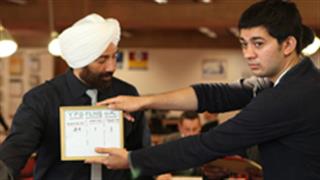The India-Pakistan bond is "above all disputes", says Pakistani singer Shafqat Amanat Ali, the magical voice behind chartbusters like
"Tere Naina" and "Mitwa", who believes that Bollywood has room for singers from all over the world.
"It's a huge market and I think with Bollywood growing so much, there is room for singers, not just from Pakistan but from all over the
world which we can see, " Shafqat told in an email interview.
"Of course, with Pakistani singers there is no language barrier, so the market and possibilities are all the more... However, the market
will only grow strong if we curb piracy as we are all in the same boat, " he added.
In his view, the India, Pakistan bond has strengthened over the years and "is above all disputes and politics..."
"Culture is always the best way to bring about people to people contact and bridge distances. Now we see a lot of Indian artists also
performing in Pakistan and we are in India often for the same and I feel proud of this, " he said.
Son of legendary Pakistani singer Ustad Amanat Ali Khan, Shafqat, started performing in India when Shankar-Ehsaan-Loy noticed him
and offered him "Mitwa" in Karan Johar's "Kabhi Alvida Naa Kehna".
The 47-year-old is now a well-known name in Bollywood and has sung for a host of Hindi movies - "Yeh Honsla" in "Dor", "Tere Naina" in
"My Name Is Khan" and "Tu Hi Mera" in "Jannat 2".
Performing live has always been Shafqat's first love.
"Live music is the best way to consume music and the biggest high for me as a singer... In fact, I am most uncomfortable and end up
saying no to live shows where they want the performance on a CD, as I don't believe in such performances. For me, a live show means
everything including the live band, " said Shafqat, who is also the lead vocalist of the Pakistani rock band Fuzon.
However, he reveals that security issues often act as roadblock for musicians in Pakistan to perform live concerts.
"It (security) is creating a problem in every walk of life here specially musicians as a lot of people are not organising shows and only A-
grade artists get shows while younger and upcoming talent here is not getting its due visibility, " Shafqat said.
"Organisers are not willing to do more shows as they are unwilling to take the responsibility for security so they minimize the risk and
organise one off shows with big artists. It is especially harmful for new talent, " he added.
Bollywood has room for singers from all over: Shafqat Amanat Ali
Wednesday, September 12, 2012 11:18 IST




















